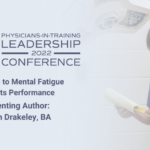Abstract | April 6, 2022
Resilience to Mental Fatigue in Sports Performance
Learning Objectives
- Define mental fatigue;
- Describe the impact of mental fatigue on sports performance in amateurs versus professional athletes during athletic competitions;
- Illustrate the importance of investigating the ability to train athletes to better endure mental fatigue and define its use as a new training modality.
Introduction: Prolonged exposure to activities with a high cognitive load result in a psychobiological state known as mental fatigue (MF). Those affected by MF feel tired, less motivated, and have lessened cognitive ability. It is well-established in literature that MF negatively impacts performance, specifically, psychomotor performance in sports.
Mental Fatigue and Sports Performance: MF impacts physical and cognitive performance. MF affects planning, sensorimotor function, cognitive control, and emotion regulation, thus increasing the risk of error. In sports, MF primarily affects psychomotor performance by affecting decision-making, accuracy, and reaction time. MF reduces the time it takes to react to a visual stimulus, compromises the ability to decide on an appropriate response, and thus decreases stimulus-response accuracy. This results in delayed or unadjusted actions, which lessen psychomotor performance.
Interestingly, professional athletes display superior resiliency to the adverse effects of MF during athletic performance. Elite athletes show stronger inhibitory control during mental exertion tasks than amateur athletes. Additionally, there is no difference in perceived effort or performance after completing a mentally fatiguing task compared to control groups. In contrast, amateur athletes exhibited significant decline in performance and increased perceived exertion. There is an apparent association between the training in elite athletes and their ability to withstand MF.
Application: Athletes and coaches know MF negatively impacts psychomotor performance. However, the literature does not indicate whether or not athletes can be trained to withstand the effects of MF for extended periods. Cognitive training protocols have yet to be established in the literature. Therefore, we will be working with a coach specialized in cognitive training to develop a protocol for athletic use. Our goal is to create interventions to assist with decision-making, working memory, planning, response inhibition, coordination, rhythm, and reaction times. The drills utilize gross motor movements while performing mental tasks using a tablet or charts with numbers or colors. Each drill aims to have the athlete make as many decisions as possible to increase cognitive load and train them for cognitively demanding competitions. We expect these athletes to improve their cognitive capacity, which will enhance sports performance by decreasing the adverse effects of MF.
References and Resources:
- Filipas, L., Gallo, G., Pollastri, L., & La Torre, A. (2019). Mental fatigue impairs time trial performance in sub-elite under 23 cyclists. PloS one, 14(6), e0218405.
- Habay, J., Van Cutsem, J., Verschueren, J., De Bock, S., Proost, M., De Wachter, J., … & Roelands, B. (2021). Mental Fatigue and Sport-Specific Psychomotor Performance: A Systematic Review. Sports Medicine, 1-22.
- Martin, K., Staiano, W., Menaspà, P., Hennessey, T., Marcora, S., Keegan, R., … & Rattray, B. (2016). Superior inhibitory control and resistance to mental fatigue in professional road cyclists. PloS one, 11(7), e0159907.
- Thompson, C. J., Fransen, J., Skorski, S., Smith, M. R., Meyer, T., Barrett, S., & Coutts, A. J. (2019). Mental fatigue in football: Is it time to shift the goalposts? An evaluation of the current methodology. Sports Medicine, 49(2), 177-183.

